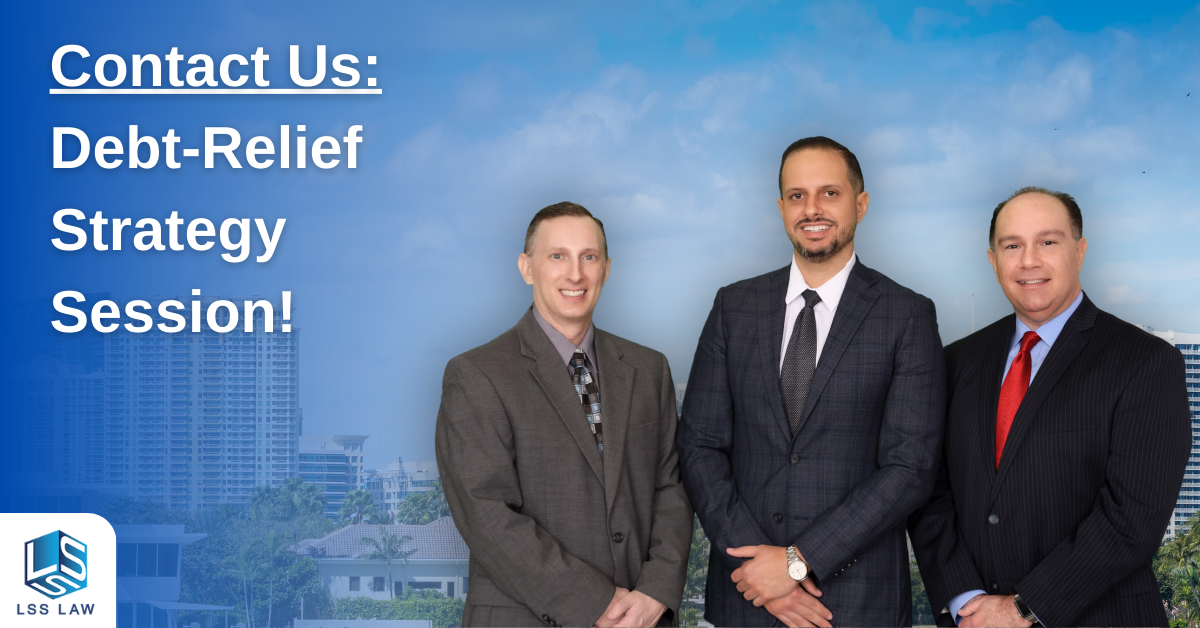Dealing with debt collectors can be stressful and intimidating. At LSS Law, we understand the challenges that come with facing debt collection and are committed to helping you navigate through this difficult time. Our experienced team of bankruptcy attorneys in South Florida offers no-cost bankruptcy Strategy Sessions to help you understand your options and develop a plan to get out of debt successfully.
In addition to our expert guidance, we also provide a free report containing “secrets that creditors don’t want you to know.” You can access this valuable information by filling out the short form on the right side of the page.
Understanding Debt Collection and Your Rights

Debt collectors are companies or individuals who collect debts owed by consumers. These can include credit card debt, medical bills, auto loans, home equity loans, and other types of consumer debt. When a debt collector contacts you, it’s essential to know your rights and the rules that govern debt collection practices.
The Fair Debt Collection Practices Act (FDCPA) is a federal law that provides guidelines and regulations for debt collectors in their attempts to collect debts from consumers. This act, along with state-specific debt collection laws, offers protections to consumers against unfair, deceptive, and abusive debt collection practices.
Here are some key points to be aware of when dealing with debt collectors:
Debt Validation
When a debt collector contacts you, he or she must provide you with a written notice containing the amount of the debt, the name of the creditor, and information on how to dispute the debt. You have the right to request written verification of the debt within 30 days of receiving this notice. The debt collector must cease collection efforts until they provide this validation information.
Disputing the Debt
If you believe the debt is not valid or the amount is incorrect, you can dispute the debt within 30 days of receiving the written notice. You should send a dispute letter via certified mail with a return receipt requested to the debt collector. This will provide proof that you sent the letter and the debt collector received it. Once the debt collector receives your dispute letter, they must stop all collection efforts until they provide you with written verification of the debt.
Communication Rules
The FDCPA prohibits debt collectors from contacting you at inconvenient times, such as before 8 a.m. or after 9 p.m., unless you agree to it. Debt collectors are also not allowed to contact you at work if they know your employer disapproves of such communication. Furthermore, if you have an attorney representing you, the debt collector must contact your attorney instead of you.
If you wish for the debt collector to stop contacting you, you can send a written request via certified mail with a return receipt requested. The debt collector must then cease all further contact, except to inform you of any legal action they may take.
Harassment and Abusive Practices
The FDCPA prohibits debt collectors from engaging in harassing or abusive behavior, such as using obscene or profane language, threatening violence, or making repeated and annoying phone calls. If a debt collector generally engages in any of these behaviors, it’s important to document the incidents and report them to the appropriate authorities, such as your state attorney general’s office or the Consumer Financial Protection Bureau.
Deceptive Practices
Debt collectors are not allowed to use deceptive practices to collect debts, such as pretending to be law enforcement, misrepresenting the amount owed, or threatening legal action they cannot or do not intend to take. If you believe a debt collector is using deceptive practices, report them to the appropriate authorities.
Statute of Limitations
Each state has its own debt collection laws regarding the time frame in which a debt collector can legally pursue collection. This is known as the statute of limitations. If a debt collector is attempting to collect on a debt that is past the statute of limitations, they may be in violation of state law.
It’s important to note that making a payment on an old debt, even a partial payment, can restart the statute of limitations in some states. Be cautious about making payments on old debts and consult an attorney if you’re unsure about your state’s law.
Credit Reporting
Debt collectors may report your unpaid debts to credit reporting agencies, which can negatively impact your credit scores. However, there are rules and time limits for how long a debt can remain on your credit report. Most negative information, such as late payments or charge-offs, can remain on your credit report for up to seven years from the date of the initial missed payment.
Protecting Yourself from Debt Collection Scams

Unfortunately, some individuals and companies pose as legitimate debt collectors in an attempt to scam consumers out of money. To protect yourself from debt collection scams, be cautious when providing personal or payment information and verify the legitimacy of the debt collector before making any payments.
Here are some red flags that may indicate a debt collection scam:
- The debt collector refuses to provide written validation of the debt.
- The debt collector threatens you with immediate arrest or legal action.
- The debt collector demands payment through unconventional methods, such as wire transfers or gift cards.
- The debt collector refuses to provide their company name, address, or phone number.
If you believe that you are being targeted by a debt collection scam, contact your state attorney general’s office, the Federal Trade Commission, or the Consumer Financial Protection Bureau to file a complaint.
Strategies for Dealing with Debt Collectors
If you’re facing debt collection, then you’ll need a plan for dealing with debt collectors and managing your financial situation. Here are some strategies to consider:
Prioritize Your Debts
When you’re juggling multiple debts, it’s important to prioritize them for repayment by interest rates, balance amount, or potential consequences for nonpayment. If you focus on paying off high-interest debts first, then you will pay less in the long run. However, this is just one of several payoff strategies.
Negotiate with the Debt Collector
In some cases, debt collectors may be willing to negotiate a payment plan or a settlement for a reduced lump sum. Keep in mind that settling a debt for less than the full amount owed can have tax consequences, so consult a tax professional before agreeing to a settlement.
Seek Professional Help
If you’re struggling to manage your debts and deal with debt collectors, consider seeking help from a credit counselor or a bankruptcy attorney. These professionals can help you understand your options and develop a plan for tackling your debts.
Consider Bankruptcy
In some cases, filing for bankruptcy may be the best option for dealing with overwhelming debt. Bankruptcy can provide a fresh start and protect you from further collection efforts. At LSS Law, our experienced team of bankruptcy attorneys can help you determine if bankruptcy is the right choice for you during our no-cost bankruptcy Strategy Sessions.
Know Your Rights Under the Fair Debt Collection Practices Act (FDCPA)
The FDCPA is a federal law that provides guidelines and regulations for debt collectors in their attempts to collect debts from consumers. This act, along with state-specific debt collection laws, offers protections to consumers against unfair, deceptive, and abusive debt collection practices. It’s important to familiarize yourself with these laws and your rights as a consumer.
Keep Detailed Records
When dealing with debt collectors, it’s important to keep detailed records of all correspondence and interactions. This includes saving copies of letters and emails, recording dates and times of phone calls, and keeping a log of what was discussed during each interaction. Having this documentation can be helpful if you need to file a complaint or dispute a debt.
Get Everything in Writing
When negotiating payment plans or settlements with debt collectors, make sure to get all agreements in writing. This will ensure that you have a clear understanding of the terms and will help avoid any misunderstandings or disputes down the line.
Don’t Be Afraid to Assert Your Rights
If a debt collector is violating your rights under the FDCPA or state debt collection laws, don’t be afraid to assert your rights and inform the debt collector of their violations. If necessary, consult with an attorney to help you navigate the situation.
Stay Informed and Seek Help When Needed
Staying informed about your rights and the debt collection process is crucial when dealing with debt collectors. Don’t hesitate to seek professional help if you’re feeling overwhelmed or unsure about your options. LSS Law is here to provide the guidance and support you need to navigate the debt collection process successfully.
Let LSS Law Help You Navigate Debt Collection

Dealing with debt collectors can be a daunting and stressful process, but you don’t have to face it alone. Our team at LSS Law is here to help you understand your rights and develop a strategy for successfully managing your debts. Click here to request your consultation.

Along with our expert guidance, we offer a free report containing “secrets that creditors don’t want you to know.” You can access this valuable information by bringing your mouse up to the top right of the page.
Don’t let debt collectors intimidate you – let LSS Law provide you with the support and guidance you need to regain control of your financial situation.
Need Help With Debt Collectors? Your Questions Answered
What should I do if a debt collector contacts me?
When a debt collector contacts you, it’s essential to know your rights under the FDCPA and your state’s own debt collection laws. Request a written validation of the debt and consider disputing the debt if you believe it’s not valid or the amount is incorrect. Maintain detailed records of all interactions with the debt collector and seek professional help if needed.
How can I stop a debt collector from contacting me?
You can send a written request via certified mail with a return receipt requested to the debt collector asking them to stop contacting you. Once they receive your request, they must cease all further contact, except to inform you of any legal action they may take.
What can a debt collector legally do to collect a debt?
Debt collectors can legally contact you by phone, mail, or email, as well as report your unpaid debt to credit reporting agencies. They may also file a lawsuit against you to collect the debt. However, they must follow the rules outlined in the FDCPA and state debt collection laws, including providing written validation of the debt and refraining from harassment or deceptive practices.
Can a debt collector garnish my wages or bank account?
In some cases, a debt collector may be able to garnish your wages or bank account if they obtain a court judgment against you. However, there are limits to how much can be garnished, and certain types of income, such as Social Security benefits, may be exempt. Consult with an attorney if you’re facing wage garnishment or bank account levies.
What should I do if a collection agency is using abusive or deceptive practices?
If a debt collection agency or a debt collection company is using abusive or deceptive practices, such as threatening violence, using profane language, or misrepresenting the amount owed, it’s important to document the incidents and report them to the appropriate authorities, such as your state attorney general’s office or the Consumer Financial Protection Bureau.
How can LSS Law help me with debt collectors?
At LSS Law, our experienced team of bankruptcy attorneys in South Florida offers no-cost bankruptcy Strategy Sessions to help you understand your options and develop a plan to get out of debt successfully. We also provide a free report containing “secrets that creditors don’t want you to know,” which you can access by filling out the short form on the right side of the page.






